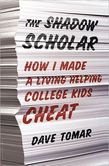By Dave Tomar
Bloomsbury Press, $25.00, 272 pages
The Shadow Scholar: How I Made A Living Helping College Kids Cheat is an indictment of the American education system, most of all. Dave Tomar wrote an article for ‘The Chronicle of Higher Education’, an educators’ newsletter, confessing to writing college term papers, theses, and even dissertations for a living. Under the pseudonym ‘Ed Dante’, he detailed his ten years as an academic ghostwriter, the online paper mills industry and the need for education reforms. Internet paper mills have been available since 1996 or so, and there are still hundreds of these companies online today.
This memoir is often told in a bitter voice. The author graduated from Rutgers University and, like many American college graduates, was burdened with huge student loan debt, found that his degree did not help him obtain the kind of work he had hoped to do, and that the university would not give him his diploma until he paid his parking fines. He spends nearly a chapter talking about the great efficiency of the Department of Transportation Services, compared to the understaffed, surly incompetence he found when dealing with the offices of Academic Affairs, Student Services, Financial Aid, or Resident Life. He goes on to follow the money generated by parking tickets and fees — nearly seven million at Rutgers in 2009. He is bitter, but very funny.
As a writer, I envy the author his experience and the writing chops he developed while preparing papers on many varied subjects. He wrote papers on the Sikh religion, how music makes him feel, Ikea chairs, a series on PTSD (post-traumatic-stress-disorder), constitutional law, kava, and hundreds of other subjects over a ten year period. The learning experience was so great for him that he refers to a PhD dissertation assignment as “my doctorate”. The PhD candidate paid four thousand dollars for the dissertation and the author completed it in five cocaine-fueled days. Of course, he was requested to do some revisions afterwards. He has a unique perspective on our education system due to his dealings with a certain type of American university student. His customers are often entitled, moneyed and demanding, but he also has customers who are barely literate. He quotes requests from college students that are incomprehensible due to their lack of grammar, vocabulary, spelling and sentence structure skills. One of the book’s questions (and there are many) is – how do illiterate young people get into college? How do they graduate? The author’s answer involves following the money. He makes the case that the banks and the universities are knowingly loaning money to people who will not be able to repay it and giving them degrees which are nearly meaningless for many.
It is easy to think that he is pointing an accusing finger at the education industry to defend himself against the charges that he has been an opportunist, a cheater himself, providing papers to cheaters for money, a man with low principles. But his arguments and revelations about higher education in America, including the for-profit schools, are so powerful and convincing that we can forgive him for earning a living as a writer. Especially now that he’s gone straight.
Reviewed by Linda J. Paul
[amazon asin=1608197239&text=Buy On Amazon][amazon asin=1608197239&text=Buy On Amazon&template=carousel]

